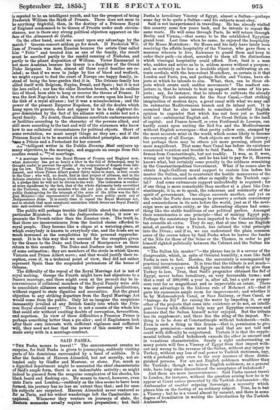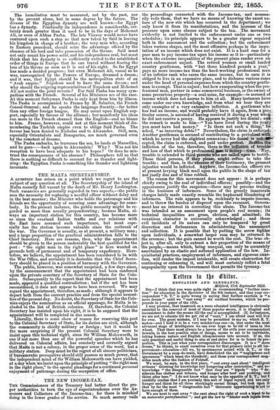SAID PASHA.
"THE Pasha means to travel !" The announcement creates no surprise, for Said Pasha is given to journeying, suddenly visiting parts of his dominions surrounded by a band of soldiers. It is after the fashion of Haroun Alraschid, but not secretly, not at- tended only by Giaffer and Mesrour, or alone. For, much as a dignified deportment might be accounted the chief characteristic of Said's ample form, there is an indomitable activity ; as might indeed be guessed from the sanguine complexion of his cheeks, his black beard and flashing eye. He means to travel, however, even unto Paris and London,—suddenly as the idea seems to have been formed, his journey has no less an extent than that ; and for once lus subjects are surprised. Haronn Alrasehid never ventured so far as Paris, and his widest wanderings left the Cassiterides un- explored. Whenever. they venture on journeys of state, the lute= monarchs usually require more preparation; bat Said Pasha is hereditary Viceroy of Egypt, almost a Sultan—perhaps some day to be quite a Sultan—and his subjects must obey.
Said is not inexperienced in travelling.. He has already visited' this country some few years back, and he intends to repeat the same route. He will come through Paris, he will return through Berlin and Vienna,—that seems to be the established Egyptian grand tour. Last time when he came, he enjoyed the hospitality of Sir Moses Montefiore : Sir Moses and his lady have lately been receiving the affable hospitality of the Viceroy, who gave them a mansion wherein to live, Kawasses to guard them and keep in order their path—in short, accorded to them all the distinctions which viceregal hospitality could afford. Now, Said is a man who, sudden and active as he is, seldom moves without a purpose; and, as certainly as he has a laudable object in cultivating an en- tente cordiale with the benevolent Montetiore, so certain is it that London and Paris, yea, and perhaps Berlin and Vienna, have ob- jects at which he intends to aim. What, then, can be those ob- jects which create such sudden movements ? The readiest con- jecture is, that he intends to beat up support for some of his pro- jects; say, for instance, that he intends to cultivate the already accruing French assistance for the Suez Canal,—that striking imagination of modern days, a great canal with what we may call its submarine Mediterranean branch and its inland port. It is surmised that he also intends to conciliate doubtful English opinion to engender that which has not been yet so hastily held out—substantial English aid. For Great Britain is the land of capital; and France herself; or even Ferdinand de Lesseps, can hardly count upon uniting the Red Sea and the Mediterranean without English sovereigns—that pretty yellow coin, stamped by the most accurate mint in the world, which seems likely to become the currency of all Europe. Such objects are worth the journey; but perhaps there may be others yet more pressing, others yet more magnificent. That same Suez Canal has before its existence occasioned vexation and trouble to Said Pasha. He obtained his firman from Constantinople, but not readily. It was, as it were, wrung out by importunity, and he has had to pay for it, Heaven knows what, but certainly some penalty in the coldness remaining in the Constantinopolitan Government. What if he comes also to obtain Anglo-Gallican moral support to sustain him before his master the Sultan, and to counteract the hostile manceuvres of the statesmen who succeed each other so rapidly in the Turkish capi- tal? And some extraneous support undoubtedly is required ; for if one thing is more remarkable than another at a place like Con- stantinople, it is, so to speak, the coherence and continuity of the spirit of government. One clique succeeds another, and yet on the whole the Porte does manage to preserve a certain consistency and connectedness in its acts before the world, just as if the sove- reign were an active entity, or the alternating cliques had some- thing like the stable traditions of our political parties. Amongst their consistencies is one principle—that of making Egypt pay. Perhaps the consistency has been imparted to the Constantinopoil- tan councils ab extra. They do say, that at one time an English mind, at another time a French, has infused the vital principle into the Divan; and if so, we can understand the plain common sense of the course taken by Said Pasha when he leaves the banks of the Nile for those of the Seine or the Thames, in order to get himself righted politically between the Cabinet and the Sultan his master.
"The Sultan his master !"—the phrase has in it a savour of the disagreeable, which, in spite of Oriental humility, a man like Said Pasha is sure to feel. Besides, the suzerainty is accompanied by practical inconveniences. It is true that the tribute is not much— only 300,000/. a year; which Egypt can better afford to give than Turkey to lose. True, that Said's progenitor obtained the fief of Egypt, never before hereditary, on very favourable terms ; and that a rent of 300,000/. a year is, after all, but a quit or pepper- corn rent for so magnificent and so improvable an estate. There was one advantage in the hideous rule of Mehemet A 1i—that it gave his successors ample room for improvement; and whether it be by Mahmoudeyeh Canal, or Suez Railway, or Suez Canal, or "barrage du Nil" for raising the water by impeding it, or any other of the projects that come into existence or do not, an intelli- gent Viceroy with efficient help may get Egyptian revenues and honours that the Sultan himself never enjoyed. But the tribute has its supplement; and there lies the sting of the impost. No- thing is to be done at Constantinople without buksheesh—vails. Even in such a thing as this firman—that is, permission to give Lesseps permission—sums must be paid that are Dot told and could with difficulty be conjectured. Certain it is that the supple- mental tribute called baksheesh exceeds the other in amount and in vexatious characteristics. Surely a right understanding on many points will free a Viceroy of Egypt from that impost with- out any wrong to the revenue of the Sultan, without any injury to Turkey, without any loss of real power to Turkish statesmen, nay, with a probable gain even to the very incomes of those distin- guished persons. For are not English noblemen wealthier than the Turkish; though we believe English noblemen, as a general rule, have long since discontinued the acceptance of buksheesh ? And there are more inconveniences: Said Pasha cannot travel to London, for instance, without the question arising how he is to appear at Court unless presented by the Turkish Ambassador—the
Ambassador of another reigning Sovereign; a necessity which places him on the footing of an ordinary subject. True, he is but
a Viceroy ; but he is a vassal almost by consent, and there is some degree of humiliation in waiting the introduction by the Turkish Ambassador. The humiliation must be measured, not by the past, nor by the present alone, but in some degree by the future. The dreams of the Egyptian dynasty are well known—for Egypt has a dynasty. Practically its independence is considerable, eer- thinly much greater than it used to be in the days of Mehemet Ali, or even of Abbas Pasha. The late Viceroy would never have ventured upon such a step as that now taken by Said in leaving his kingdom in charge of a brother; the very man who, according to Eastern precedent, should seize the advantage offered by the absence of his lord and take possession of the throne. Said must not only count his power solid, and his independence real, but must think that his dynasty is so sufficiently united to the established order of things in Europe that he can travel without fearing the loss of his throne as soon as it is out of his sight. So far Egypt has made a decided progress ; but even Mehemet Ali, vassal as he was, unrecognized by the Powers of Europe, dreamed a dream; and it was, that Egypt should be the metropolitan state of an "Arab empire." Napoleon used to have the same dream ; and why should the reigning representatives of Napoleon and Mehemet Ali not realize the joint reverie ? For Said Pasha has many sym- pathies with the French. Several of his Ministers are of the race. At this moment Suleyman Pasha is only kept from him by illness. The Pasha is accompanied to France by M. Sabatier, the French Consul-General ; and he speaks the language fluently—far better than any other foreign tongue. He may count upon English sup- port, especially by favour of the alliance; but manifestly his ideas run more in the French channel than the English—and no blame to him. France, however, could not at this moment think of dis- membering the Turkish empire even to oblige Said Pasha. The favour has been denied to Nicholas and to Alexander. Still, men, especially Orientalists and Bonapartes, are much governed even by the remotest of dreams.
The Pasha embarks, he traverses the sea, he lands at Marseilles, and he goes—back again to Alexandria! Why ? Was not his reception to have been adequate to his hopes ? Or does he mis- trust the consequences of his absence ? Philosophers tell us that there is nothing so difficult to account for as thunder and light- ning: the Egyptian Pasha is something like thunder and lightning incarnate.



























 Previous page
Previous page